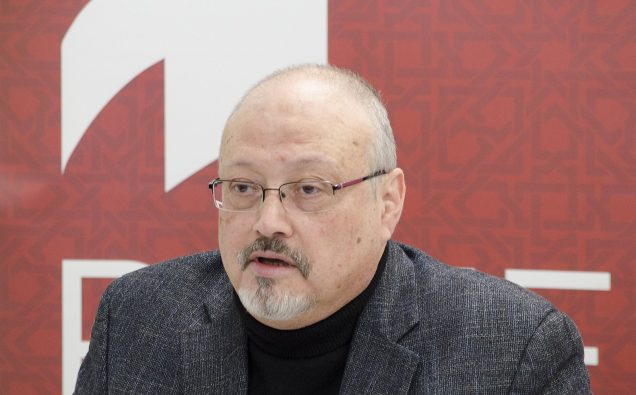
Nearly three weeks after Jamal Khashoggi went missing in Saudi consulate in Istanbul, President Recep Tayyip Erdogan posed a string of questions to Riyadh as he confirmed the killing of the journalist and demanded that suspects face law in Turkey.
But Erdogan revealed little new details and appeared to be leaving room for Saudis to come clean on the killing of the dissident writer that has convulsed much of the international community as it took place inside a diplomatic mission premises.
Missing in Erdogan’s speech were details about audio or visual proof that the Turkish media outlets – considered to be representative of Ankara’s views and policies – have been leaking in the past few weeks.
While Riyadh has admitted that Khashoggi – a critic of the conservative kingdom and a proponent of democratization with previously close links to the royal family – the Western countries and Turkey have said the official Saudi accounts fall far short of a full enquiry.
“Why was the 15-man Saudi team in Istanbul on the day of the murder?” he asked. “On whose orders? We are seeking answers. Why was the consulate not opened to investigators immediately? When the murder was so clear, why were there so many different statements given by Saudis? Why has the body of someone, the killing of whom has been officially admitted, not been found? Who is the local collaborator who disposed of Khashoggi’s body? Saudi must answer all these questions.”
Saudi Arabia and Turkey have a high-stakes relationship, marred by tensions over regional issues. Erdogan – whose policies have been criticized for violative of human rights and civic liberties after a failed coup against his government – has emerged as a strong critic of Riyadh over Khashoggi’s disappearance.
The United States, Riyadh’s political ally in the conflicted Middle Eastern region and defense partner, is also trying to wrestle with calls for retribution for the alleged Saudi ruling family’s role in the killing of Khashoggi, who demanded democracy for the Arab countries.
The U.S.-Saudi Arabia relationship has been under scrutiny for another factor – the U.S. supply of weapons for Riyadh’s war against its poverty-stricken neighbor Yemen.
In his latest statement on the Khashoggi case, President Donald Trump has said the death of Saudi journalist Jamal Khashoggi was the result of a “plot gone awry” but has rejected the idea of halting weapons sales to the kingdom.
In an interview with USA Today Trump said he had talked on the phone with both Saudi Crown Prince Mohammad bin Salman and Turkish President Recep Tayyip Erdogan and that more details about what happened inside the Saudi Consulate in Turkey would be known within a day or two.
“He says he is not involved nor is the king,” Trump said of the Saudi crown prince. If their involvement was proven, “I would be very upset about it. We’ll have to see.”
Reflecting the tight diplomatic walk his Administration has been into since the revelation of Virginia-based Saudi journalist’s death, Trump said that he is “not satisfied” with the Saudi explanation.
He has also said he finds the Saudi explanation to be credible.
The president told The Washington Post the Saudi’s “stories are all over the place” and said “there’s been deception and there’s been lies.”
Turkey, Riyadh and the United States have still not offered definitive accounts of the killing of the journalist. What is clear is that the Khashoggi case lies at the heart of the Middle Eastern and Arab nations’ desire for openness and democracy – which have been denied to them for far too long. The decades-long denial of democracy has resulted in all kinds of troubles including exacerbation of sectarian divisions, emergence of militant groups like ISIS and the terrible waste of human resource across the region – from Saudi Arabia to Iran.
After the 2011 Arab Spring of movements for democracy – that began in Tunisia and Egypt and met a fatal and brutal response in Syria – the Khashoggi case is demanding world support for democracy in the Middle East. How Washington conducts its relationships in the Middle East is a big factor in the equation. The challenge may be tough but it needs to be addressed – for the sake of world peace and the long-term well being of the Arab world.

















